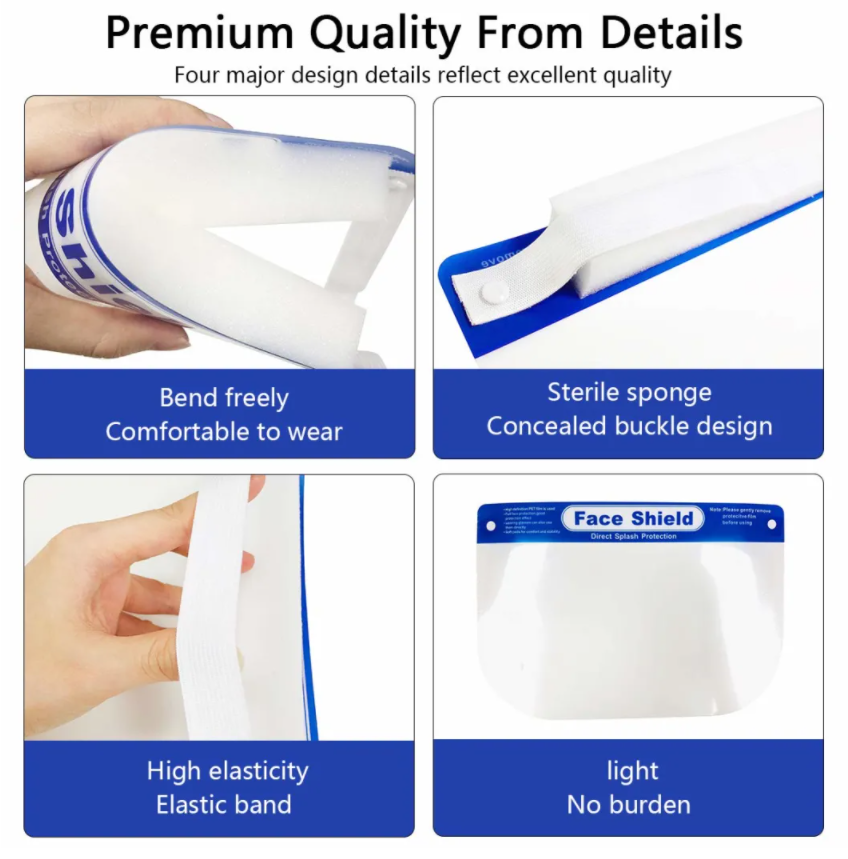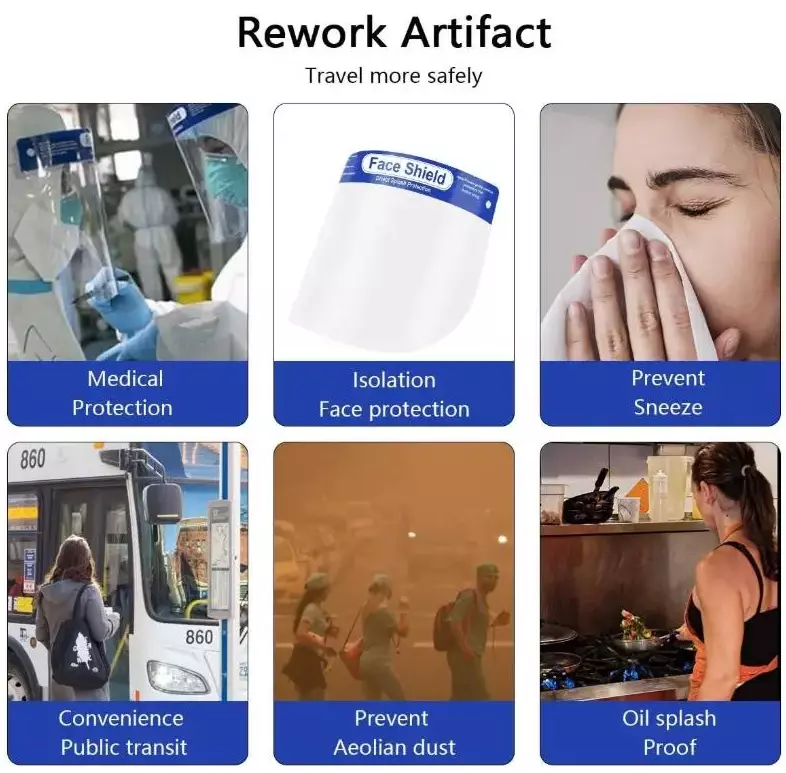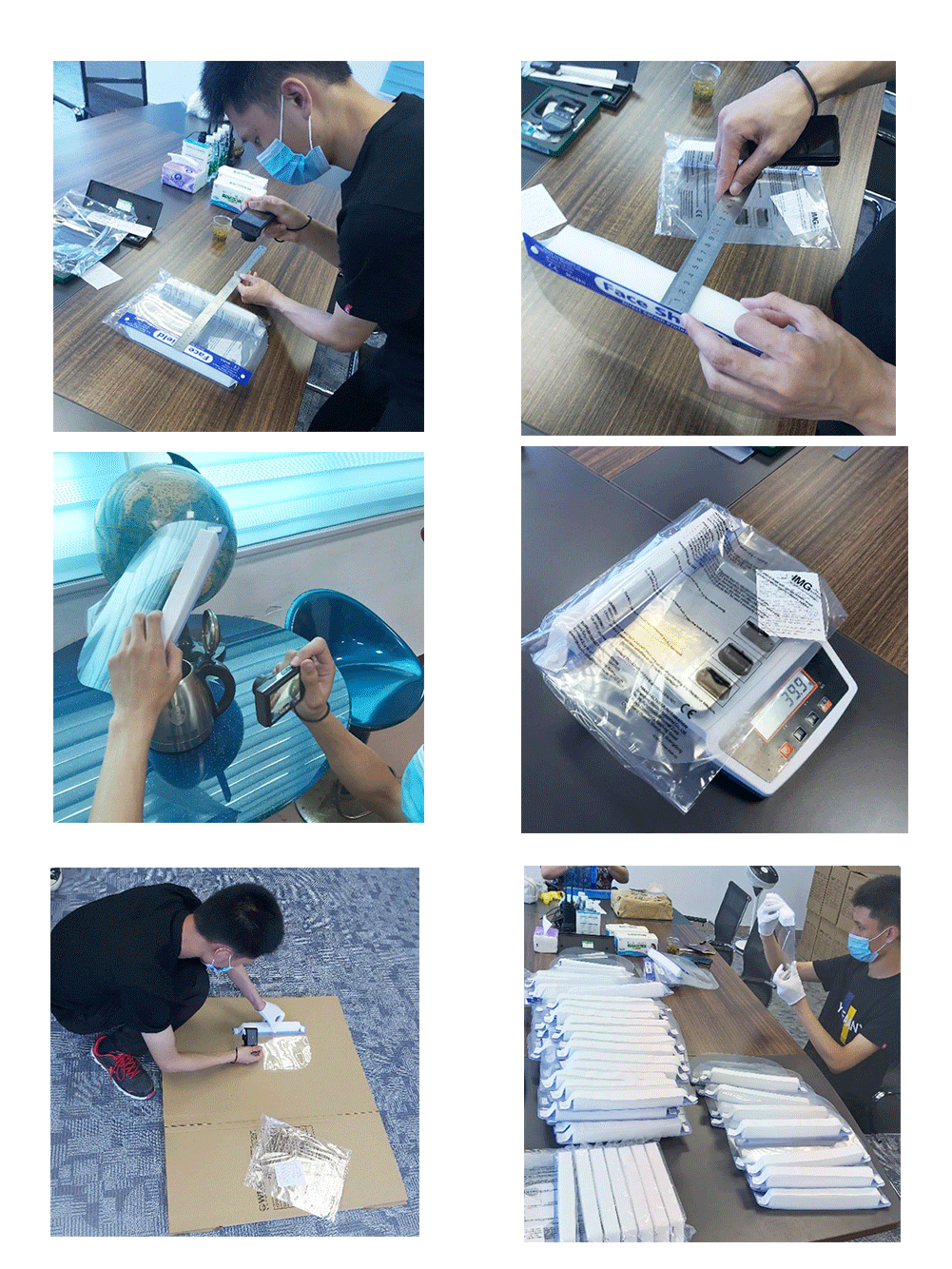Stefan Wolf, CEO of German auto parts ElringKlinger, provoked a thousand words on the German Stuttgart newspaper. He said: "The Chinese government has notified several German auto parts manufacturers not to continue to independently pass through China. Subsidiaries conduct business, and in the future these companies must form joint ventures with local Chinese companies to continue their business in China."
It is a new product suitable for our daily life ,plastic face shield can be used in outdoor activities to prevent damage to s caused by sun or air dust etc.A clear protective film on the surface prevent scratches.
Protective face shield is equipped with a transparent window, which can make the field of vision clearer.
The top of the protective face shields also has a soft sponge and an adjustable elastic band, which is more convenient for users to use. The disposable plastic face shield can be packaged individually or in a pack of 12 according to customer requirements.
The plastic protective film on the plastic surface must be torn off before use.
Product name: Protective Face Shield.
Size: 32*22cm/30*19.5 cm / Customized.
Color: Clear/ Customized.
Material: Double anti-fog PET sheet +sponge + elastic band
Sample: Freely
Sample time: 3-6 working days
Application
Quality test
Kids Face Shield,Disposable Plastic Face Shield,Pet Face Shield,Anti-Fog Face Shield Shenzhen Stardeal Industrial Co.,Ltd , https://www.plasticblisterpacks.com
The reason why the above news is highly concerned by the industry is that the restrictions on foreign shares in the auto parts sector have been cancelled as early as ten years ago.
The 2004 version of the "Automotive Industry Development Policy" no longer imposes a stock ratio restriction on foreign component manufacturers, allowing them to operate in China in a sole proprietorship or joint venture.
For the whole vehicle joint venture, the “protective policy red line†with a foreign shareholding ratio of no more than 50% has not been loosened. The “China Automotive Industry Policy†promulgated in 1994 and the “Guidance Catalogue for Foreign Investment Industries†promulgated at the end of 2011 The clear provisions of the revised version continue to this day.
Only relevant regulations have been made for new energy auto parts joint ventures. On April 1, 2011, the National Development and Reform Commission's "Guidance Catalogue for Foreign Investment Industries (Revised Draft for Comments)" requires "new energy vehicle key components, including power batteries, cathode materials, diaphragms, battery management systems, motor management systems, and electronic control. Integrated, drive motor, coupled drive system, electric air conditioner, electric brake, electric power steering, idle start and stop device, etc., the proportion of foreign capital (shareholding) does not exceed 50%." The purpose may be to prevent foreign auto parts manufacturers from expanding too fast, so as to reserve development time and market space for local new energy auto parts manufacturers, so that China can speed up the independent research and development capabilities in the joint venture process.
This kind of regulation is a lesson learned from the lessons learned. In the field of traditional auto parts, the liberalization of restrictions on foreign-owned component manufacturers has led to the expansion of foreign-owned component manufacturers to establish wholly-owned factories in China or to acquire Chinese shares in joint venture factories. At the same time, we are constantly looking for opportunities to annex some of the most outstanding local auto parts companies and consolidate their strong position in the segmentation field. In the field of key parts and components of traditional automobiles, foreign-funded component manufacturers are more obvious with the leading technology monopolizing the market.
According to relevant information, foreign component manufacturers firmly control the vast majority of markets that control domestic automotive electronics and powertrain components. According to data from the Ministry of Commerce of the People's Republic of China, auto parts manufacturers with foreign investment background accounted for more than 75% of the entire industry in 2012. Among the manufacturers, the wholly-owned enterprises accounted for 55%, and the Sino-foreign joint ventures accounted for 45%. At the same time, domestically produced domestically produced parts and components only account for 20%-25% of the industry's total, while auto parts manufacturers with foreign investment background account for more than 75% of the industry.
This situation is not conducive to the product upgrade and independent innovation of local auto parts companies. On the contrary, the chasing of international auto parts predators has hindered their transformation from the production of "low value-added products" to the production of "high value-added products". The process has made it impossible to break through in the high-end parts and products, and the living conditions are difficult to be optimistic, and the entire automobile industry is also hollowing out.
All of this is closely related to the deviation of the automobile industry policy. Therefore, the rumors about the restrictions on foreign shares in the auto parts sector are regarded as correcting the policy.
There is no free lunch in the world, and the unprincipled handcuffs should not exist in the market. However, the 2004 version of the "Automotive Industry Development Policy" unconditionally took the initiative to cancel the stock ratio limit for foreign-invested parts and components, which is indeed ridiculous and puzzling.
When paying attention to the restrictions on the foreign shares of key components of new energy vehicles, Fu Yuwu, the secretary-general of the China Automotive Engineering Society, once said: "If we give up the dominant position and simply let the market go out, then the Chinese parts. The sustainable development of the industry in the future is terrible. The Chinese auto market is very active, but if it is a joint venture, it will leave some opportunities for Chinese parts companies. If it is completely liberalized, then foreign companies will drive straight into our core components and electricity. There is definitely no chance to control the motor and control system."
It should be pointed out that if we want to promote joint ventures in the field of auto parts, we should also promote cooperation between Chinese and foreign auto parts companies, rather than joint ventures between foreign auto parts manufacturers and more complete vehicle manufacturers. Otherwise, foreign auto parts manufacturers will expand their mutual business adhesion with vehicle manufacturers. Nearly the water tower will receive a large number of orders in the first month, and more freely and easily enter the supporting system of the automakers. Said that it is a new blow. The effect of the policy should be highly consistent with the original intention of the hair. A counterexample is that the "joint venture autonomy" requirement has been accused to indirectly help foreign-invested manufacturers to use the eliminated models to suppress local independent brands.
The father of Tao Ran believes that creating an ecological environment that can compete with competitors lies in the fact that local enterprises themselves strive to rise and embrace the sun.
The fundamental reason for the failure of the market-changing technology in the whole vehicle sector is that the Chinese side of the joint venture is lying on a hotbed of profit sharing and is eager to cook the frog by foreign capital. The deeper reason is that the policy of “market-for-technology†only requires form, but does not require connotation – insufficient assessment of the development of independent undertakings, which directly leads to slow improvement of independent research and development capabilities.
Avoid repeating the mistake of “only paying joint venture profits and ignoring self-technical progressâ€. The Chinese side of auto parts joint ventures should take the core technology as the top priority and the goal.
Although most foreign auto parts manufacturers have completed their formations today, it will be difficult to change the pattern of sole proprietorship, but it is not too late. Even if the auto parts stock ratio policy cannot be changed, it can continue to improve the industry's ecology in accordance with the Anti-Monopoly Law. The Anti-Monopoly Bureau of the National Development and Reform Commission recently attacked the horizontal monopoly of the auto parts field, and conducted interviews and punishments on some manufacturers who manipulated the price and supply, which better safeguarded the legitimate rights and interests of downstream manufacturers and end consumers. Create a more fair, just and fully competitive industry environment.
It is also an international practice to try to protect local enterprises without violating WTO rules. Changing the trend of domestically-owned parts and components enterprises to be marginalized and pulling them on the path of healthy and sustainable development requires policy assistance. How to strengthen local companies with clever and superb policies will test the courage and wisdom of policy makers.



March 07, 2024